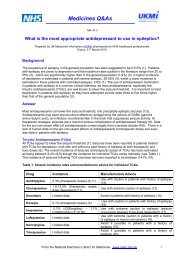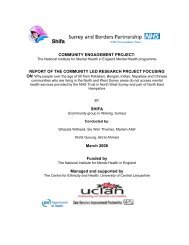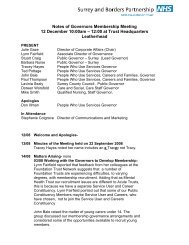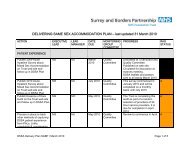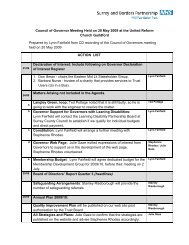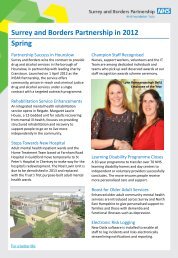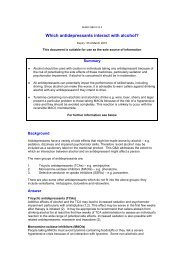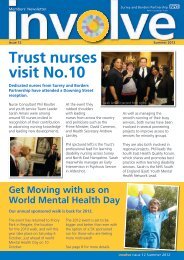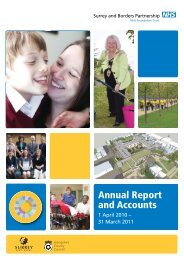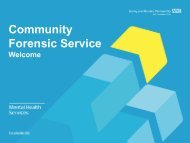Here - Surrey and Borders Partnership NHS Foundation Trust
Here - Surrey and Borders Partnership NHS Foundation Trust
Here - Surrey and Borders Partnership NHS Foundation Trust
Create successful ePaper yourself
Turn your PDF publications into a flip-book with our unique Google optimized e-Paper software.
Commentary <strong>and</strong> Debate<br />
qualification, doctors surveyed reported<br />
work experience as being a more<br />
important determinant of career choice<br />
when choosing psychiatry than with<br />
other specialties (Goldacre 2005). This<br />
would indicate that foundation posts in<br />
psychiatry may have a positive effect on<br />
recruitment, <strong>and</strong> this has been borne out<br />
to some extent (Boyle et al, 2009). Even<br />
where a doctor is unable to work in a<br />
foundation post, tasters in psychiatry can<br />
be organized as part of the foundation<br />
programme in order to give the<br />
foundation some additional experience<br />
of psychiatry.<br />
Unfortunately, doctors’ experiences of<br />
psychiatry if they are not doing a<br />
foundation post may be limited to<br />
occasional acute presentations, which if<br />
they do not have access to a psychiatric<br />
liaison service may be very difficult <strong>and</strong><br />
frustrating to manage. Liaison psychiatry<br />
services, where they exist, may present<br />
valuable opportunities for psychiatrists to<br />
demonstrate the relevance of the specialty<br />
across all branches of medicine, to portray<br />
a positive image of psychiatry to our nonpsychiatric<br />
colleagues as well as to<br />
educate <strong>and</strong> motivate those doctors who<br />
are as yet undecided in their career choice<br />
towards considering psychiatry as a career.<br />
In summary, the major possible targets for<br />
recruitment into psychiatry would appear<br />
to be improving undergraduate experience<br />
in a variety of ways, maximising positive<br />
exposure to psychiatry during the<br />
foundation years, <strong>and</strong> supporting those<br />
who show an interest in psychiatry early<br />
on. Ideally any strategy should be coupled<br />
with an overarching aim to increase the<br />
profile <strong>and</strong> awareness of the importance<br />
<strong>and</strong> validity of psychiatry as a profession<br />
amongst the lay population as well as the<br />
medical community.<br />
So what has been done to address the<br />
problem? The Royal College of<br />
Psychiatrists has taken urgent steps by<br />
means of a Scoping Group on<br />
Undergraduate Education in Psychiatry,<br />
which has helped to develop a core<br />
curriculum for undergraduate psychiatry.<br />
Work is also being done with the<br />
Academic Faculty <strong>and</strong> the Association of<br />
University Teachers of Psychiatry to address<br />
issues within the undergraduate<br />
experience that adversely affect the image<br />
of psychiatry (Brown et al, 2009).<br />
The Royal College has also prioritised a<br />
process of engaging more closely with<br />
medical students. A student associate<br />
grade has been introduced, whereby<br />
interested students can sign up to the<br />
Royal College for free <strong>and</strong> gain access to<br />
various resources, such as electronic<br />
versions of the Royal College’s<br />
publications, a dedicated section of the<br />
Royal College website, reduced prices for<br />
college events <strong>and</strong> a variety of other<br />
benefits. An annual summer school has<br />
been organised in collaboration with the<br />
Institute of Psychiatry <strong>and</strong> South London<br />
<strong>and</strong> the Maudsley <strong>NHS</strong> <strong>Foundation</strong> <strong>Trust</strong>.<br />
A lot of this work has been done with the<br />
help of the Psychiatric Trainees<br />
Committee, who have also embarked on a<br />
project of developing student psychiatry<br />
societies in each medical school across the<br />
UK. These societies, with the support of<br />
local consultants, academic departments<br />
<strong>and</strong> trainees, aim to foster interest <strong>and</strong><br />
raise the profile of psychiatry within<br />
medical schools by means of talks, careers<br />
events <strong>and</strong> educational meetings (Royal<br />
College of Psychiatrists, 2008).<br />
There is an additional aim to exp<strong>and</strong> the<br />
numbers of foundation posts available<br />
within psychiatry, however this will require<br />
extensive negotiation <strong>and</strong> planning with<br />
the <strong>Foundation</strong> Schools <strong>and</strong> is an ongoing<br />
project. The Psychiatric Trainees<br />
Committee is also developing an e-<br />
learning project to enable foundation<br />
doctors to develop psychiatry<br />
competencies, which will be mapped to<br />
the new foundation curriculum, <strong>and</strong> with<br />
an emphasis on the overlap of psychiatric<br />
problems <strong>and</strong> physical health problems.<br />
This project endeavours to increase the<br />
resources available for foundation doctors<br />
to further their underst<strong>and</strong>ing of the<br />
relevance of psychiatry to the medical<br />
profession as a whole.<br />
26 <strong>Surrey</strong> <strong>and</strong> <strong>Borders</strong> Online Journal www.sabp.nhs.uk/journal



